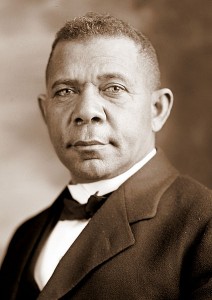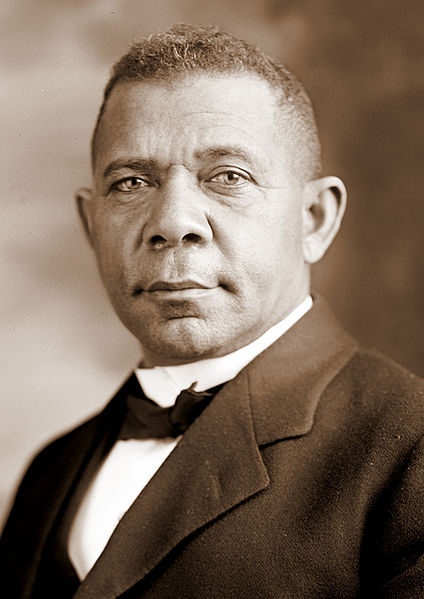 Originally posted at American Thinker.
Originally posted at American Thinker.
Former slave Booker T. Washington, in a 1901 autobiographical book Up From Slavery, made the following poignant statement:
When we rid ourselves of prejudice, or racial feeling, and look facts in the face, we must acknowledge that, notwithstanding the cruelty and moral wrong of slavery, the ten million Negroes inhabiting this country, who themselves or whose ancestors went through the school of American slavery, are in a stronger and more hopeful condition, materially, intellectually, morally and religiously than is true of an equal number of black people in any other portion of the globe.
Despite being victimized by the harshest of life’s conditions, Booker T. was a man without bitterness whose gratefulness and humility was exhibited in word and deed. Washington believed that moral fiber, hard work, and marketable skills earned respect for the black man from even the most ardent Southern racist.
Based on his accomplishments and writings, one can assume that if Booker T. were alive to witness corrupt black politicians like Charlie Rangel, Maxine Waters, and John Conyers stealing with one hand while arguing for reparations with the other, the Tuskegee Institute’s founder would be appalled.
The idea of compensating slave descendants began in the 1890s. After the Civil War, newly freed men were promised, but never received, “forty acres and a mule.” The reparation argument is that, in perpetuity, the government is responsible for compensating the ancestors of slaves “in consideration of the coerced and uncompensated labor their ancestors performed over several centuries.”
Alien to modern-day race-baiters on the left, Booker Taliaferro Washington’s attitude toward the institution that enslaved him was this: “Ever since I have been old enough to think for myself, I have entertained the idea that, notwithstanding the cruel wrongs inflicted upon us, the black man got nearly as much out of slavery as the white man did.”
Washington’s outlook was quite contrary to that of modern politicians who stir racial unrest and support reparations in conjunction with lacking the moral fiber Booker T. promoted.
With the same zeal with which a dignified Booker T. encouraged individuals to work and earn their way out of slavery’s injustices, unethical politicians like Rangel, Waters, and Conyers continue to stipulate the need for reparative compensation. Accused of ethical violations, all three behave in a manner that smacks of a “you owe me” mentality.
Ex-slave-turned-esteemed-educator Booker T. Washington said, “Nothing ever comes to me, that is worth having, except as the result of hard work.”
John Conyers (D-MI) introduced HR 40 (a number purposely chosen to symbolize forty acres and mule), a Commission to Study Reparation Proposals for African-Americans Act. Since 1989, Conyers has made certain every Congress institutes a commission to study slavery’s “fundamental injustice, cruelty, brutality, and inhumanity” and to “examine the lingering negative effects of the institution of slavery” in order to consider “any form of compensation to the descendants of African slaves.”
Yet while carrying the torch to expose slavery’s injustice, John Conyers forced two former staff members to “baby-sit his children, run errands and work on political campaigns while they were on his congressional payroll.”
In 2009, Conyers again was implicated in his wife Monica Conyers’ bribery scheme. As passage of HR 40 drags on and the amount of warranted recompense and in what form is not yet legally clarified, it appears that Conyers, on more than one occasion, found ways to grant slave damages to himself.
Charlie Rangel is a forty-year congressman in New York’s 15th district and a former chairman of the tax-writing House Ways and Means committee. Rangel is another politician pushing for reparations, and based on Charlie’s unscrupulous behavior, he would likely reject the Booker T. formula that “[s]uccess is to be measured not so much by the position that one has reached in life as by the obstacles which he has overcome.”
Rangel maintains that disparities need to be closed through reparations in “several critical areas including education, from elementary school to college; assuring quality health care to adults and children; employment, economic and business opportunities; equal justice and retirement security.”
To the contrary, Booker T. believed that “[n]o greater injury can be done to any youth than to let him feel that because he belongs to this or that race he will be advanced in life regardless of his own merits or efforts.”
Charlie agrees more with Obama’s liberal, “share the wealth” reparations policy agenda. The New York representative allegedly amassed personal reparations in the form of economic and business opportunities, as well as retirement security for himself by way of thirteen ethics violations, including tax evasion.
The allegations include failure to report rental income from vacation property in the Dominican Republic and hundreds of thousands of dollars in additional income and assets on his financial disclosure statements, use of congressional staff and stationery to raise money for a college center in New York named after him, accepting favors and benefits from the donors that may have influenced his congressional actions, use of a subsidized New York apartment as a campaign office instead of a residence, and misuse of the congressional free mail privileges.
Cosponsor of HR 40 Maxine Waters (D-CA) once suggested that government could and should deposit funds into minority banks. Waters is now under investigation for bank-related conflict of interest, or what appears to be illegal reimbursement. “Waters … has been under investigation for a possible conflict of interest involving a bank that was seeking federal aid. Her husband owned stock in the bank and had served on the board.” Waters “defended her role in assisting minority-owned banks in the midst of [a] financial meltdown” Maxine helped instigate.
Waters’ political prerogative would have fared better if the congresswoman cleaved instead to the words of Booker T. Washington, who maintained that “[t]he world cares very little what you or I know, but it does care a great deal about what you or I do.”
Both Rangel and Waters plan to plea bargain with the ethics committee to excuse filling personal coffers with overdue recompense, implicitly justifying funds as owed to them as descendants of slaves. Booker Taliaferro would see it differently. According to Washington,
There is another class of coloured people who make a business of keeping the troubles, the wrongs, and the hardships of the Negro race before the public. Having learned that they are able to make a living out of their troubles, they have grown into the settled habit of advertising their wrongs – partly because they want sympathy and partly because it pays. Some of these people do not want the Negro to lose his grievances, because they do not want to lose their jobs.
Regardless of race, Booker T. Washington’s century-old insight sheds light on a concept all Americans need to grasp. Our nation is presently being subjected to unethical career politicians whose racist entitlement mentality justifies personal political corruption. Supposed “public servants” hope to benefit by fostering disunity, demeaning every African-American by stressing neediness over strength, and demanding remuneration for injustices long paid for with the blood of those who fought and died to abolish slavery — a system the appreciative and virtuous Booker T. Washington, unlike Conyers, Rangel, and Waters, actually suffered and endured.

